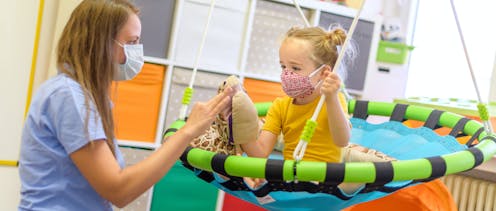A new ministry sets out to improve services and accessibility for New Zealanders living with disabilities
- Written by Susanna Trnka, Associate Professor, University of Auckland

The recent announcement[1] of a new Ministry for Disabled People is a watershed moment for people living with disabilities in Aotearoa New Zealand.
It comes none too soon, as COVID-19 has affected disability communities badly. Lockdown, particularly at levels 3 and 4, has put many disabled people in a nefarious catch-22. The very measures put in place to protect them are also often responsible for exacerbating their health conditions.
In our research[2] we document the views of young New Zealanders with central nervous system disorders such as celebral palsy, chronic pain or illness, attention deficit hyperactivity disorder (ADHD[3]) and post-traumatic stress disorder (PTSD[4]).
Our findings show repeatedly that young people with disabilities would like to have a greater voice in determining policies and services — and in identifying what their needs actually are.
Throughout the pandemic, the government has emphasised the need to protect the vulnerable, including those with underlying health issues and disabilities. But, overwhelmingly, the messaging has been to non-disabled people about the needs of the disabled population. Very little space has been made for the voices of the vulnerable.
Disability rights activists and scholars have long argued[5] people with disabilities are as limited by society’s perceptions[6] of their impairments as by the impairments themselves.
They are often restricted from being fully able to participate in their own care because society takes being able-bodied for granted. Curbs on pavements that don’t allow for easy wheelchair access are just one obvious example.
Read more: How pandemic responses neglected disabled people's rights[7]
Disabling the disabled
During the pandemic, it has become evident how social priorities further disable people with disabilities. Some of the provisions necessary for large-scale lockdowns — such as remote learning and working from home — are the very same disability activists have spent years, if not decades, campaigning for.
When the abled-bodied required these services, there was widespread mobilisation to shift education, corporate and other working environments and conferences online.
Another evident gap is the impact of long-term lockdowns on health and well-being. There is now a well-documented backlog of healthcare provision, including in physiotherapy[8], occupational therapy[9] and surgeries[10]. While this has widespread implications for all New Zealanders, it is particularly detrimental to individuals with disabilities who often rely on such services more urgently.
Read more: Only one fifth of school students with disability had enough support during the remote learning period[11]
One of the young people we spoke with suffers from a central nervous system disorder that causes severe body-wide chronic pain and generalised weakness on her right side. She said the delay in treatments such as physiotherapy has made her physical conditions much harder to bear while also causing her to worry about possible long-term deterioration.
Others mentioned repeated delays of care for chronic pain. Appointments were sometimes put off for more than three months.
The consequences included not only ongoing physical pain but also not being able to take part in activities like exercise, drawing or gaming. Previously, such activities helped take the edge off living through lockdown.
Towards a new normal
Our interviews and online observations also revealed lockdowns have doubled the mental health burden for many disabled youth, adding to or intensifying existing issues on top of other disabilities.
Their social media posts frequently note frustration over the suspension of regular services. Some wonder if they can’t access care because they aren’t currently “manic or psychotic” enough. One said there seemed to be a widely held assumption people can somehow “put crisis aside during lockdown”.
Many we spoke to were also unaware of the reinstatement, in late October, of health services including physiotherapy, occupational therapy and dental therapy in regions currently under alert level 3 restrictions. This suggests better communication is needed.
We are not suggesting lockdowns are not justifiable. But their cost should be more openly discussed and better managed. We also need to hear from a range of people, including those in whose name these measures are being promoted.
Hopefully the new Ministry for Disabled People will be an avenue for this kind of engagement.
But these changes must permeate more broadly as part of looking at ways we can all be protected from COVID while also trying to mitigate disadvantage falling too heavily on those who are already struggling.
Any much-vaunted “return to normal” must include a rethinking of what normality is. The previous status quo required significant improvements, particularly for the disabled community. Let’s hope the new normal includes and values the complexity of individuals with disabilities.
References
- ^ announcement (www.beehive.govt.nz)
- ^ research (www.digitalmentalhealth.co.nz)
- ^ ADHD (www.kidshealth.org.nz)
- ^ PTSD (mentalhealth.org.nz)
- ^ argued (pwd.org.au)
- ^ limited by society’s perceptions (disabilityhorizons.com)
- ^ How pandemic responses neglected disabled people's rights (theconversation.com)
- ^ physiotherapy (www.1news.co.nz)
- ^ occupational therapy (www.newshub.co.nz)
- ^ surgeries (www.rnz.co.nz)
- ^ Only one fifth of school students with disability had enough support during the remote learning period (theconversation.com)
















